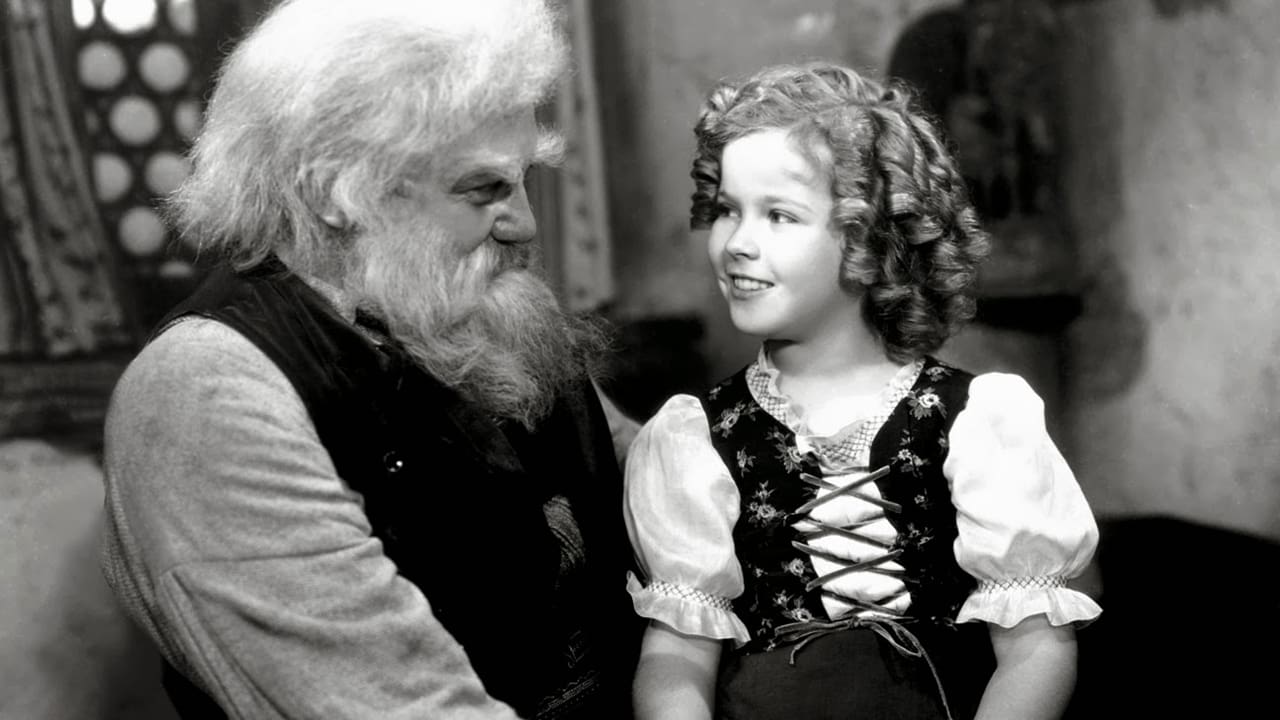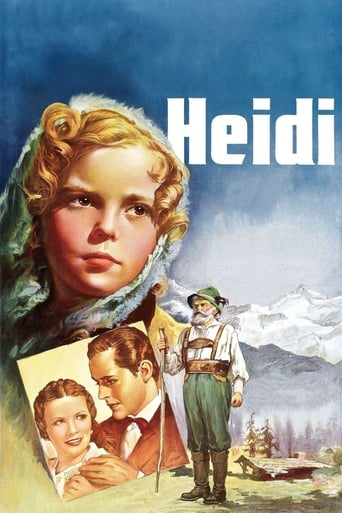SpuffyWeb
Sadly Over-hyped
Asad Almond
A clunky actioner with a handful of cool moments.
Marva
It is an exhilarating, distressing, funny and profound film, with one of the more memorable film scores in years,
Winifred
The movie is made so realistic it has a lot of that WoW feeling at the right moments and never tooo over the top. the suspense is done so well and the emotion is felt. Very well put together with the music and all.
weezeralfalfa
Be aware that this is an adaptation of the classic story, which I read long ago. However, I have recently read a summary of the original story, and can compare the film with that. I found that the film is about half true to the book and about half a vehicle for S.T. and some of the other actors. For example, the goat herder Peter is an important character in the book, but is barely present in the film. This jibes with the general lack of interactions between Shirley and boys in her films, in contrast to her general close association with some man or men. As is true of most of her films, she is a virtual or actual orphan, nearly always lacking a real mother for at least most of the film. Her interactions with girls are also usually nearly absent, although one girl is important to this story. Of course, the main theme of the film and book: orphan Heidi restoring her grandfather's faith in people and God, was made for Shirley's stock character. Also the extreme hostility of governess Rottenmeier toward Heidi fit perfectly with the standard case where Shirley has to deal with a very unpleasant person, who may or may not be reformable. In the case of her grandfather, he was, but Miss Rottenmeier was not. "Little Miss Fix-it" was clearly present in reforming her grandfather and in encouraging wheelchair-bound Klara to make an adequate attempt to walk. In contrast, in the book, Heidi is not directly responsible for encouraging Klara to walk. Rather, her wheelchair is destroyed and she has to try to walk, and this happens much later in the story. The whole section where grandfather walks to Frankfurt to find Heidi, and his adventures in Frankfurt is a fabrication. Thus, the role of grandfather in returning Heidi to her beloved mountains is also a fabrication, as is the attempt by ex-governess Rottenmeiere to sell Heidi to a gypsy. The dream sequence, where Heidi goes to Holland and sings "Our Little Wooden Shoes", was suggested by Shirley, to help liven things up in one section. I assume that the hysterical segment where the capuchin enters the Frankfurt house and causes untold mischief, was also added to liven things up.So, why was Governess Rottenmeier so strict and mean to Heidi? For one thing, she often was slow to adapt to Rottenmeier's strict way of doing things. She was responsible for the capuchin getting into the house. She looked upon Heidi as a competitor in taking care of Klara and for approval by Klara's father. If Heidi's presence somehow enabled Klara to walk normally, Rottenmeier feared she might be considered an unnecessary expense and lose her job. Heidi's aunt pointed this out. Thus, Heidi wanted Klara to get well soon, so she could return to her mountain home, whereas Rottenmeier had a vested interest in keeping Klara believing she would never walk again. Besides the capuchin and Heidi's unfamiliarity with upper class Frankfurt living, goats are a source of comedy. A billy goat flattens Heidi with his head butt. Heidy has trouble learning to milk goats.Mary Nash(as governess Rottenmeier) and Marcia Mae Jones(as Klara) would return the following year, both as tormenters of Shirley this time, for "The Little Princess". Arthur Treacher also returns in that film , playing his stock character: the model, but comedic, butler.It's my contention that, in large part, Shirley typically represents a talkie musical female version of Charlie Chaplin's Little Tramp. Both are part child and part adult in their behavior and thinking. Both are singular entities, devoid of peer group friends or siblings or parents. Both are looking for acceptance as an adult and romance with the opposite sex(father-daughter platonic, in the case of Shirley)
roddekker
Yes. Of course, I do realize that this movie is now 80 years old (and, yes, times were definitely different back then) - But, hey, from my point of view - I thought it was actually pretty sad to see how Hollywood had typecast young actress Shirley Temple to the point where, at the age of 9 (in Heidi), she was still playing the exact same, cookie-cutter character that she had been continually playing since the age of 4.(Of course, Temple would continue to play this exact same character for yet another 4 years, until she started to develop breasts and make demands that her studio cast her in more demanding and age-appropriate roles) For the most part - (From an adult's perspective) - I found this 1937 picture (whose story was set in 1880) to be far too overly sentimental for its own good and way too heavy-handed when it came to its emphasis on the "religious" angle of its story.Yes. There were some OK moments in this picture - But, from where I was sitting, I just could not warm up to Shirley Temple's recycled-to-death screen-persona of chubby cheeks, golden ringlets and plucky demeanor, ad nauseam.
rebschucks
The story of Heidi is kind of hard to present to film-goers. As a book it's wonderful and engaging, but it's just not movie material. Thus we get versions like this, with kidnapping and gypsies and an evil witch of a Fraulein Rottenmeier who wants to keep Klara sick and bring Heidi down.But how can you not love Shirley Temple? She just takes any movie and makes it golden! And we also have the heart of the story: a little girl who teaches a grumpy old man to open up his heart again. And those two things by themselves help the movie to shine.A wonderful classic, especially for young viewers, but also good for the young at heart!
ccthemovieman-1
Some people have said this is Shirley Temple's best film. It's not my favorite but I admit it is very, very good....and it has some of the most touching, wonderful moments of any of her films. In fact, there were several times in the first part of this film that produced tears in my eyes. Of course, I am an old sentimentalist. Nonetheless, this is wonderful stuff.The only reason I don't rank this among my favorite Temple films is the mean old lady, "Fraulein Rottenmeier," played by Mary Nash, has too big a role in the second half of the movie making for a number of unpleasant scenes. I had gotten so involved with the story that I couldn't stand to see this mean woman so nasty to "Heidi" (Temple). Also, there was only one song-and-dance number and that's not enough for Shirley Temple movie.The other characters were fine. Arthur Treacher provides good humor; Jean Hersholt is great as the gruff-then-loving grandfather and Marcia Mae Jones is nice as the young invalid.This is a true classic story and ends with perhaps the most gorgeous and sweetest smile I've ever seen on Shirley's face.

